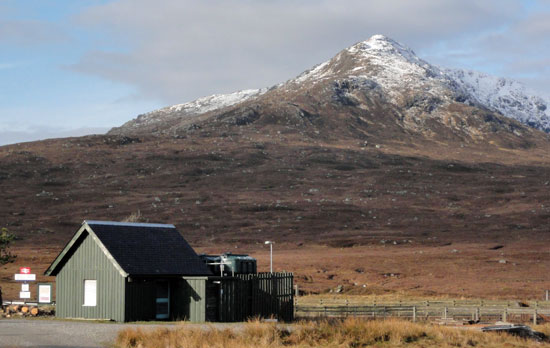Blog
Occasional posts on subjects including field recording, London history and literature, other websites worth looking at, articles in the press, and news of sound-related events.
Time off in the Scottish Highlands
A COLLEAGUE AT work warned me that field recordists working in the Scottish Highlands find it hard to avoid capturing the sound of falling water, whatever they’re trying to record.
True to the spirit of the prediction, it was raining when I arrived at Rannoch station. There was nothing else to do except sit under cover and wait for the shower to pass. Rainwater gurgled down drainpipes from the station roof:
When the rain was done I headed west along the track to Glencoe and was soon alone in the expanse of Rannoch Moor. There was near silence, broken once by the calls of geese on a loch. A hummock with a nearly level top made a pitching spot for the tent.
Early in the morning sleet began to fall. This is what it sounded like from inside the tent:
The sleet turned to snow and under its weight the tent’s inner fabric began to press down like a clammy shroud. Time to get up and out. If you’re tempted to go wild camping in cold weather, do take good gloves, as otherwise life will become difficult when your hands stop working.
The snow didn’t lie for long and by early afternoon it had all melted on the lower ground. The weather moved restlessly from showers to gusts of wind, brief sunshine, then more rain. The moor was sodden. Streams and rivulets fed vast boggy sponges of sphagnum moss or drained into ponds filled with Bovril-coloured water, their sides crumbling away to expose ossuaries of whitened heather-roots.
Among the woodland on the north side of Loch Laidon, the moss-covered ruin of a toppled pine did a good take on Rodin’s Thinker as an old man:

Remembering the advice about trying to avoid running water, I searched for a recording spot well away from any streams so as to capture the subtle sounds of the forest. I used the Audio Technica BP4025 single-point stereo mic, which you can read a review of here. It has self-noise of 14dB, which is pretty low, and the mic fits inside a Rode blimp. The DPA 2006Cs usually work well as spaced or baffled mics but unfortunately they’re too noisy for such quiet surroundings, even though they’ll produce a better stereo image than the BP4025.
If a field recording is like a very simple story, then this one goes: The wind stirred the tree-tops but then died down and more birds started singing. It’s seven minutes long.
The next stop north on the West Highland Line is Corrour. It’s very remote and the nearest public road is ten miles away. All around is a solemn, processional landscape where the mountains are stacked in avenues stretching northwest to Ben Nevis.

Corrour was the setting for the scene in Trainspotting where the lads escape Edinburgh for the day to try and get in touch with their Scottish roots. Someone’s uploaded it to YouTube.

Loch Ossian lies to the east of Corrour and along its shores are some good spots for discreet overnight camping. The air seemed to thicken and blur as dusk approached and a few birds made their song before roosting by the loch:
The trip was partly a holiday, but some of the recordings are also intended for a new site section which is starting to be put together behind the scenes. The demands posed by the weather and the very low levels of background noise are completely different to those found in a city. One mistake I made was neglecting to bring a tripod along on which to attach the blimp and mic. Because of this I wasn’t able to make good recordings of the faint sounds made by the wind blowing over the mountain-tops and across the moor.
But, all things considered, it was worth it just to get away from the stress and aggravation of life in London.
By now he could not utter a word, he could understand nothing, and he imagined he was a simple ordinary man walking quickly, cheerfully through the fields, banging the ground with his stick, while above him was the open sky bathed in sunshine. Now he was as free as a bird and could go wherever he liked! – Anton Chekhov
ABOUT SOUND
FIELD RECORDINGS
The balloonist in the desert is dreaming
The Binaural Diaries of Ollie Hall
GEOGRAPHY AND WANDERINGS
The Ragged Society of Antiquarian Ramblers
LONDON
ORGANISATIONS
Midwest Society for Acoustic Ecology
World Forum for Acoustic Ecology